Click the links below for…
Ken’s blog, regarding his journey to document his family’s history
an audio interview with Ken’s mother and father, discussing Germany
an audio interview with Ken’s mother and father, discussing immigration and life in US
a separate audio interview with Ken’s mother and father about Germany
an audio interview with Ken’s uncle, Alfred Schoen
an audio interview with Ken’s uncle, Eliezer Schoen
an audio recording of a ceremony held for Ken’s mother, Betty Schoen
Ken and daughter Rebecca discussing Schoen family history
an audio interview with Inge Wimmer, from Schoen hometown of Vacha
an audio interview with Günter Hermes, another historian from Vacha
Ken’s paternal family, the Schoens, once hailed from Vacha, Germany. Ken’s great-grandfather Yekutiel raised his family in Völkershausen – a village just south of Vacha. Together with his wife Hanna (maiden name Nelkenstock), Yekutiel had six children: Jütte – who is believed to have died in childbirth, Rosalie, Frieda, Kaufmann, Louis, and Ida.





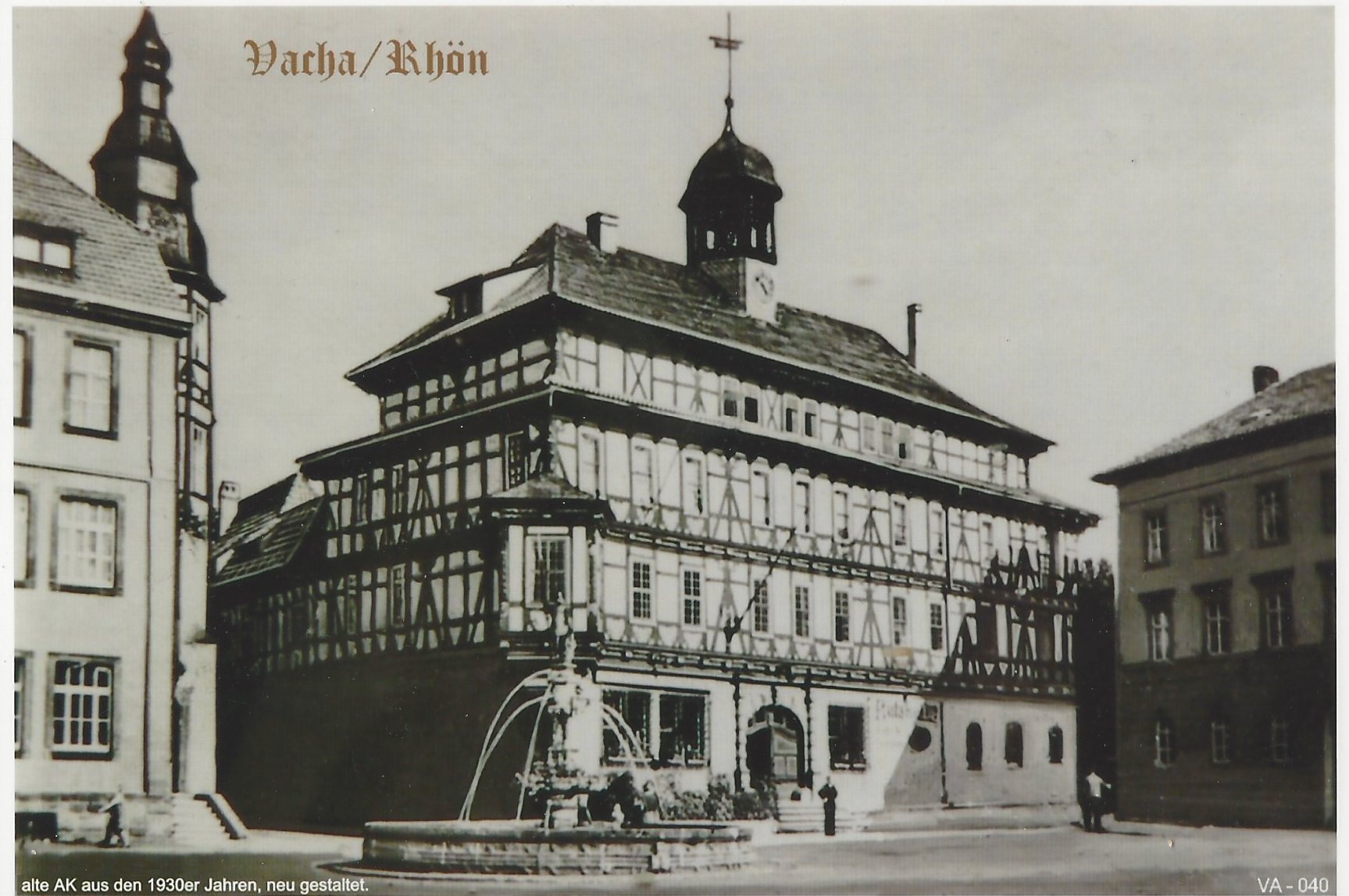 Vacha
Vacha
Vacha is a small town in central Germany. The Schoen family owned a farm in Völkershausen, and traded cattle. Kaufmann, Ken’s grandfather, would marry Sophie Kahn in 1898. Sophie would die giving birth to Kaufmann’s first child, Sophie Schoen. Kaufmann remarried Therese Heimann, and they have four more children: Isaak, Selma, Siegfried Eliezer, and Alfred.
Click here for a history of the Jewish community in Völkershausen.





Susan Taube née Strauss writes:
…the street we lived on was at one time Thüringer Strasse or ‘Steinweg’, it changed names at one time. This street went through Vacha, almost from the beginning to end under different names. On that street were, as much as I remember, 4 Jewish families: Strauss, Schoen, Baumgart, and Bachrach. Other names I remember were a few families: Goldschmidt, Katz, Isaak, Blau, there were more but I can’t remember the names.


Kaufmann’s eldest, Sophie Schoen, would marry Julius Katzenstein, and together they would have two children, Jerry and Rena.
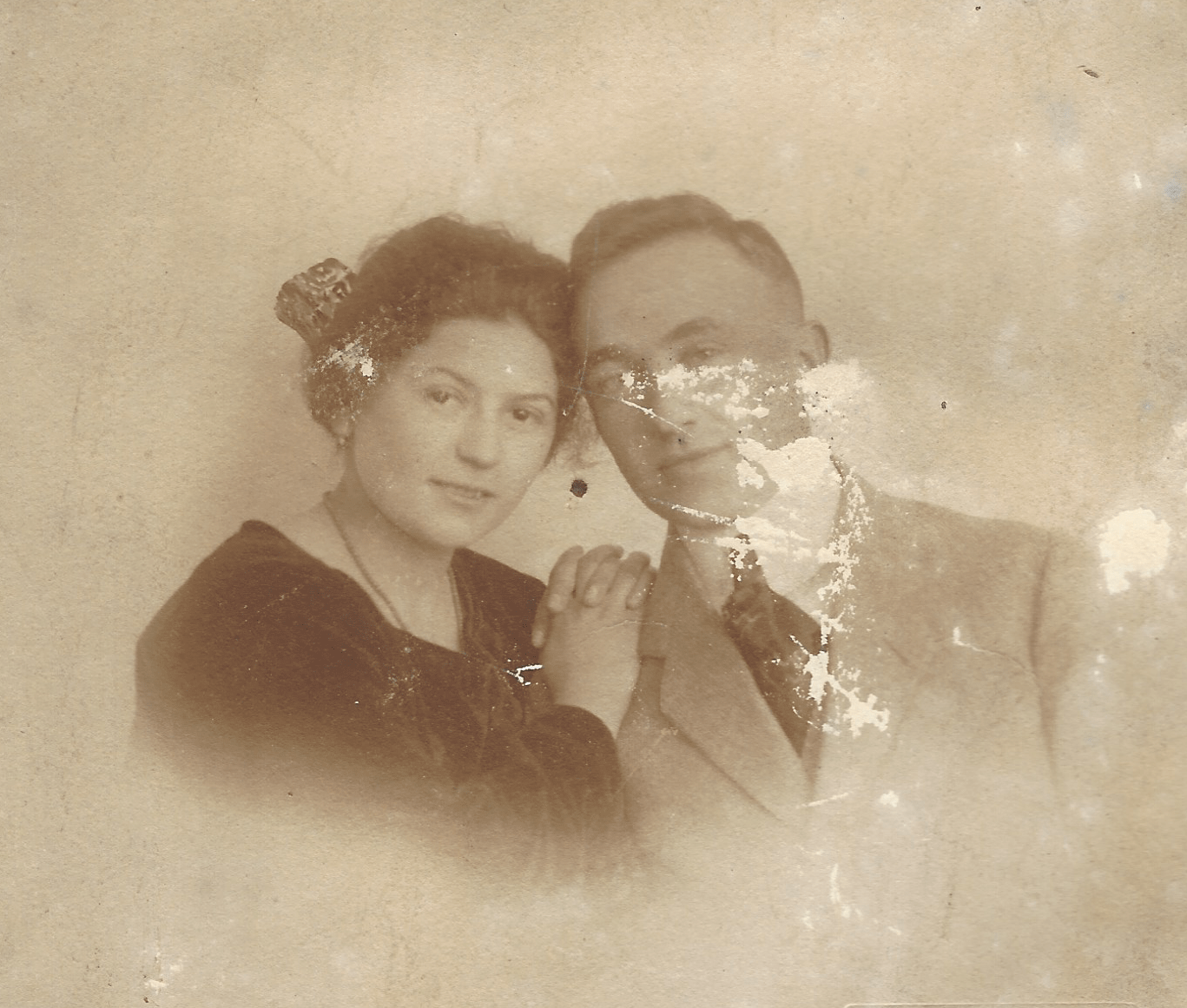
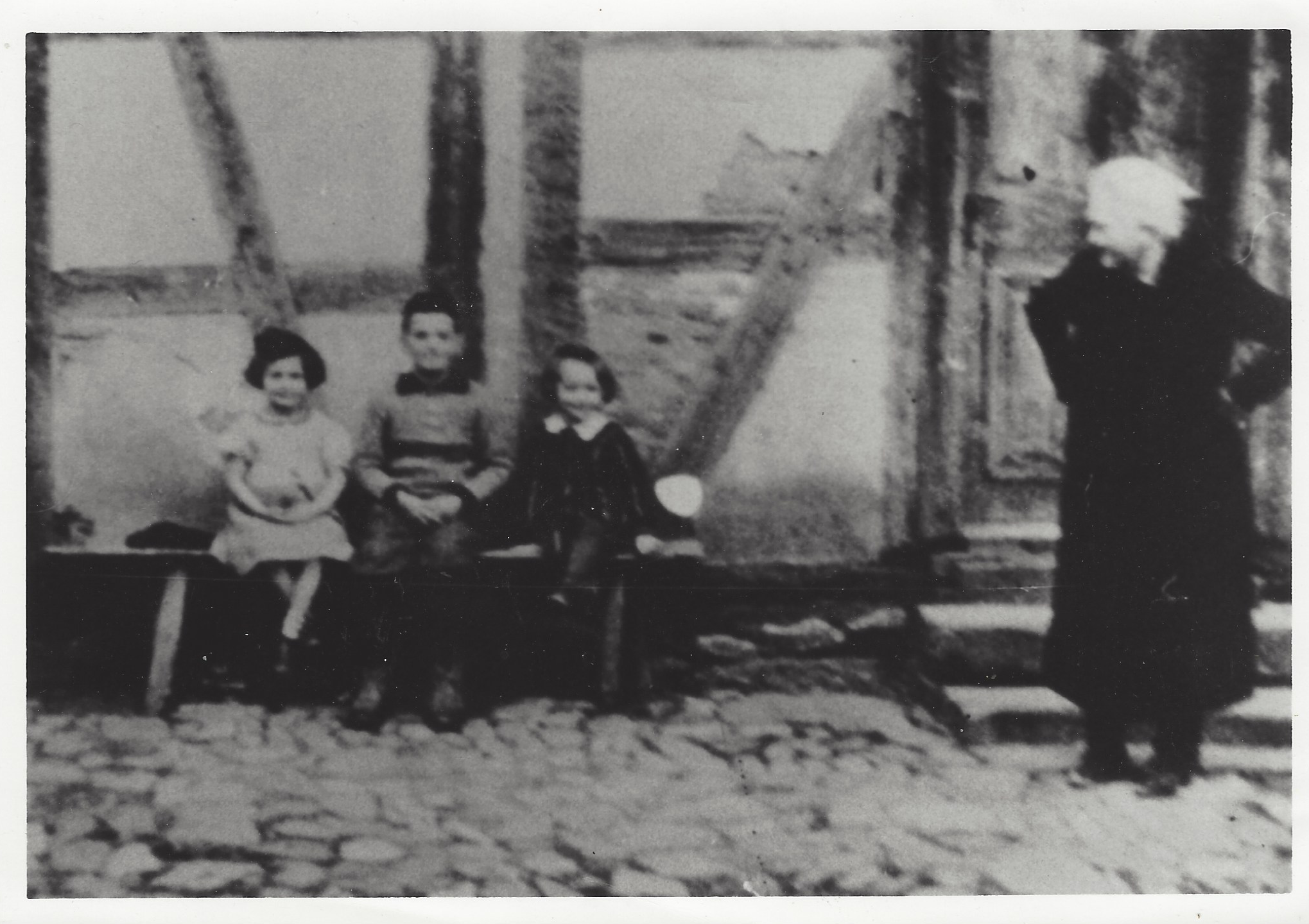
Isaak’s Journey
Ken’s father, Isaak, worked in Leipzig for a number of textile, cloth, and leather manufacturers throughout the 1920s. In 1925, he would begin efforts to emigrate to the United States. In order to emigrate, Isaak was required to provide work documents from his jobs in Germany, as well as references from past employers. In 1927, Isaak’s emigration request would be approved and he would arrive in New York by the end of the year. He began work in the New York coffee business. He took the name Irving at this time.
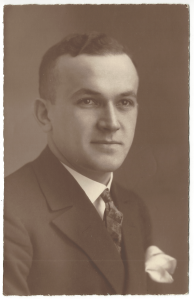
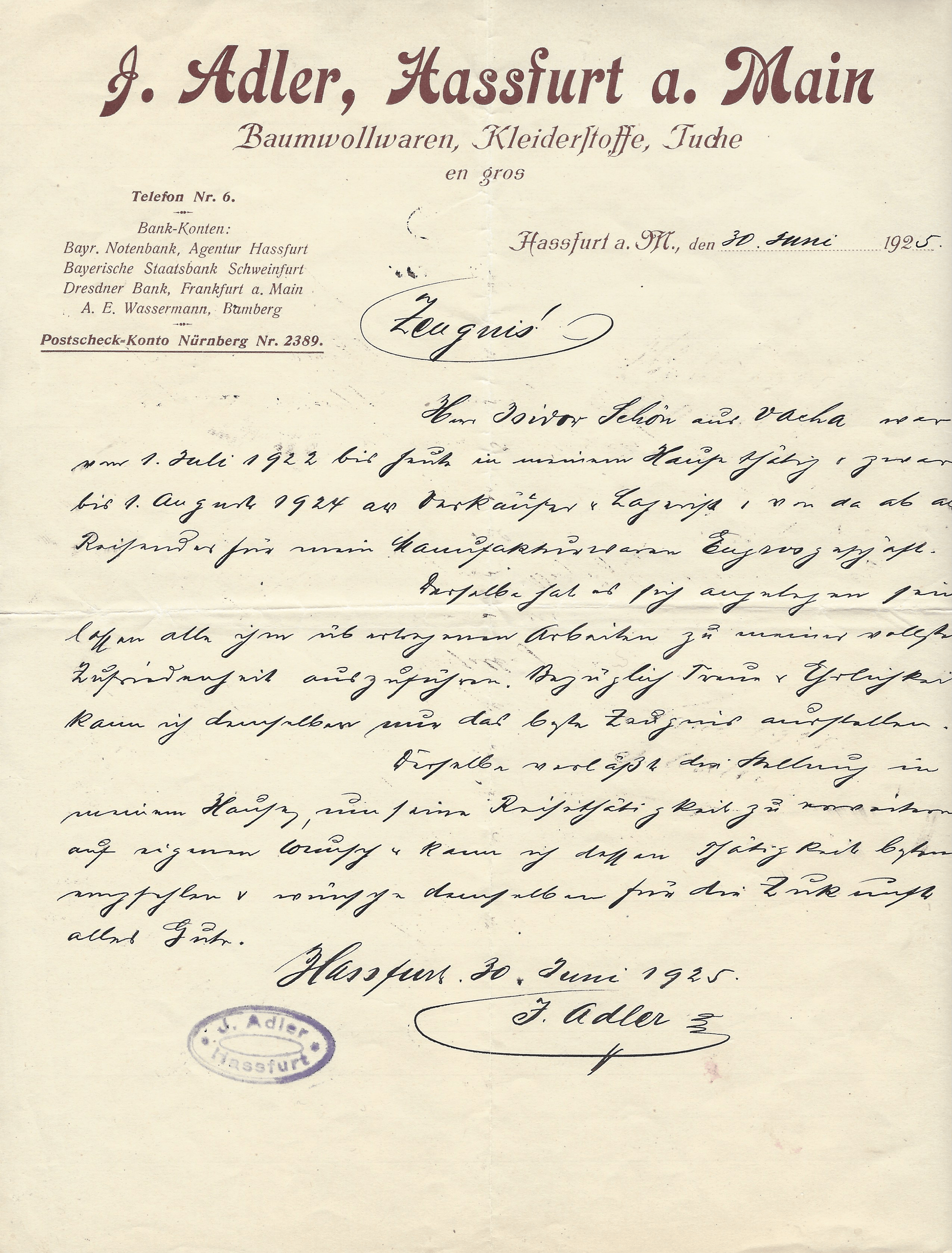

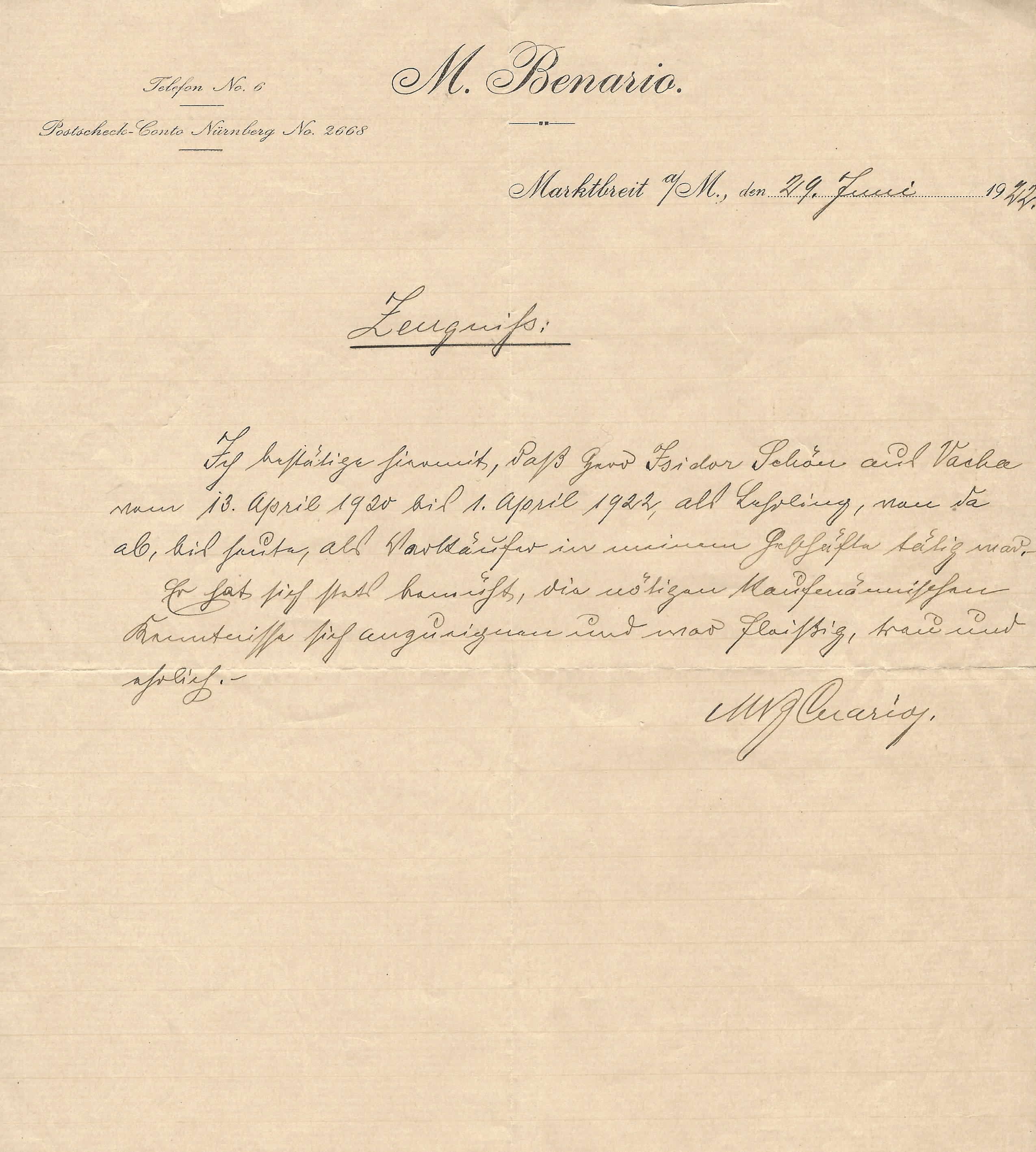






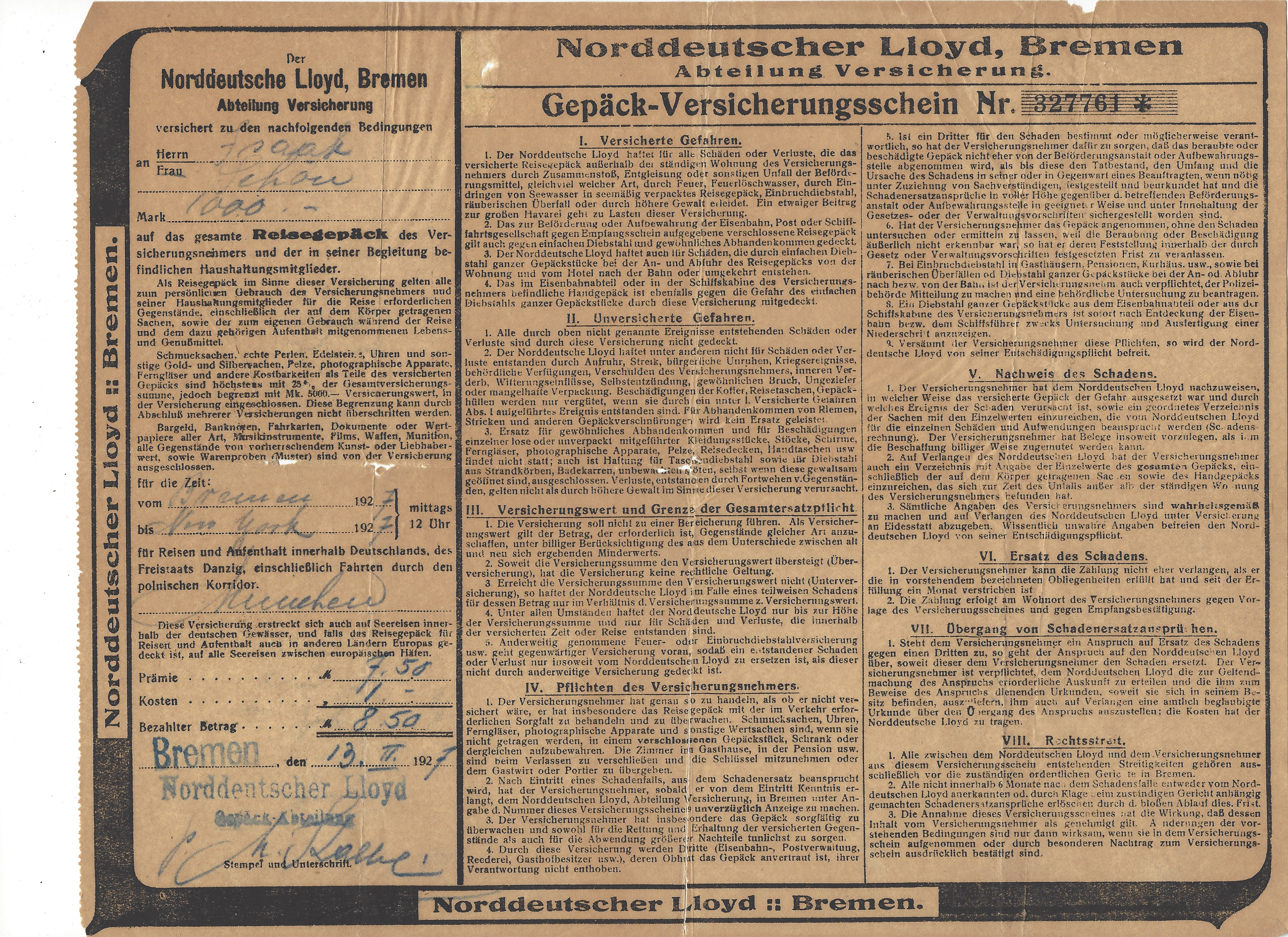
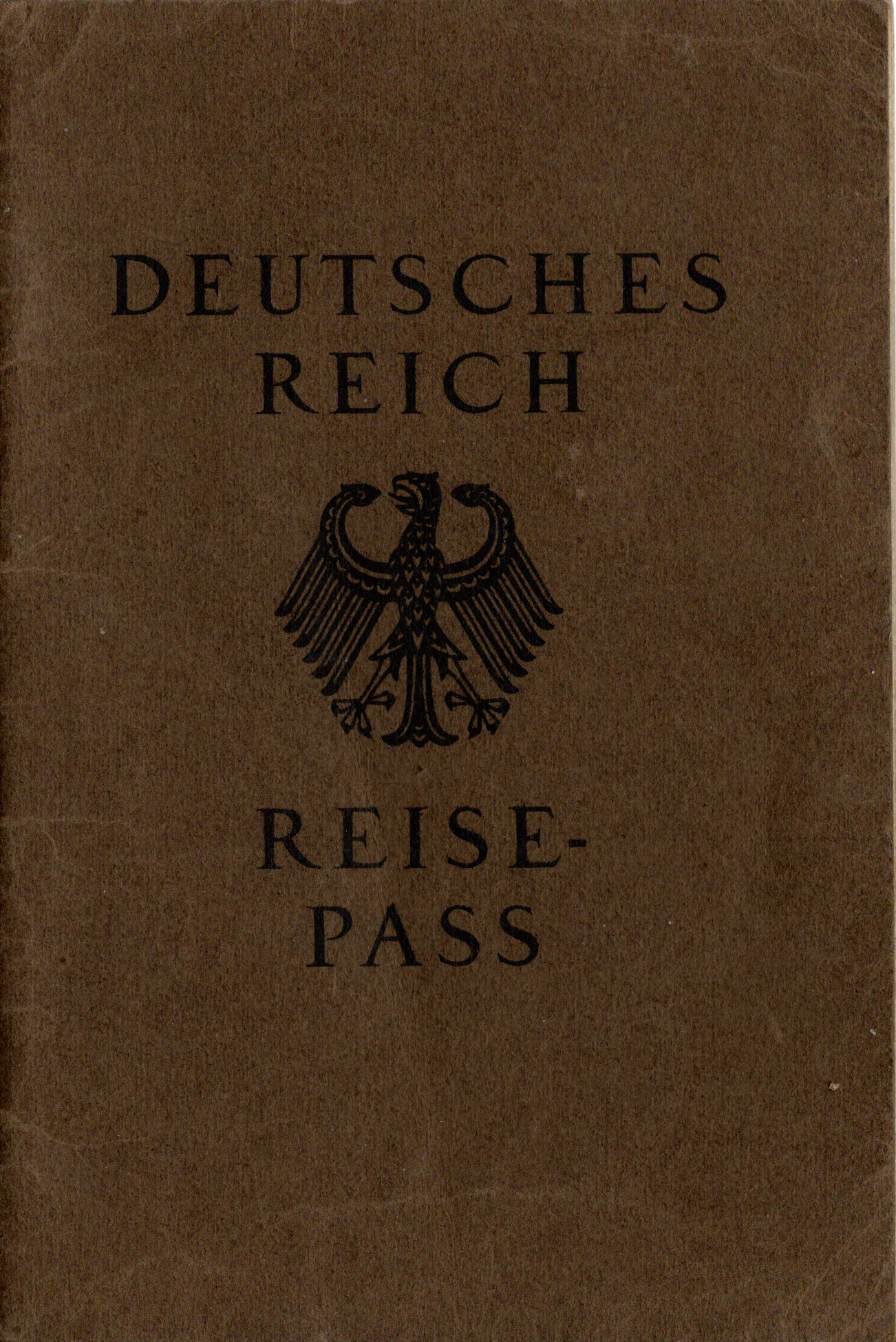

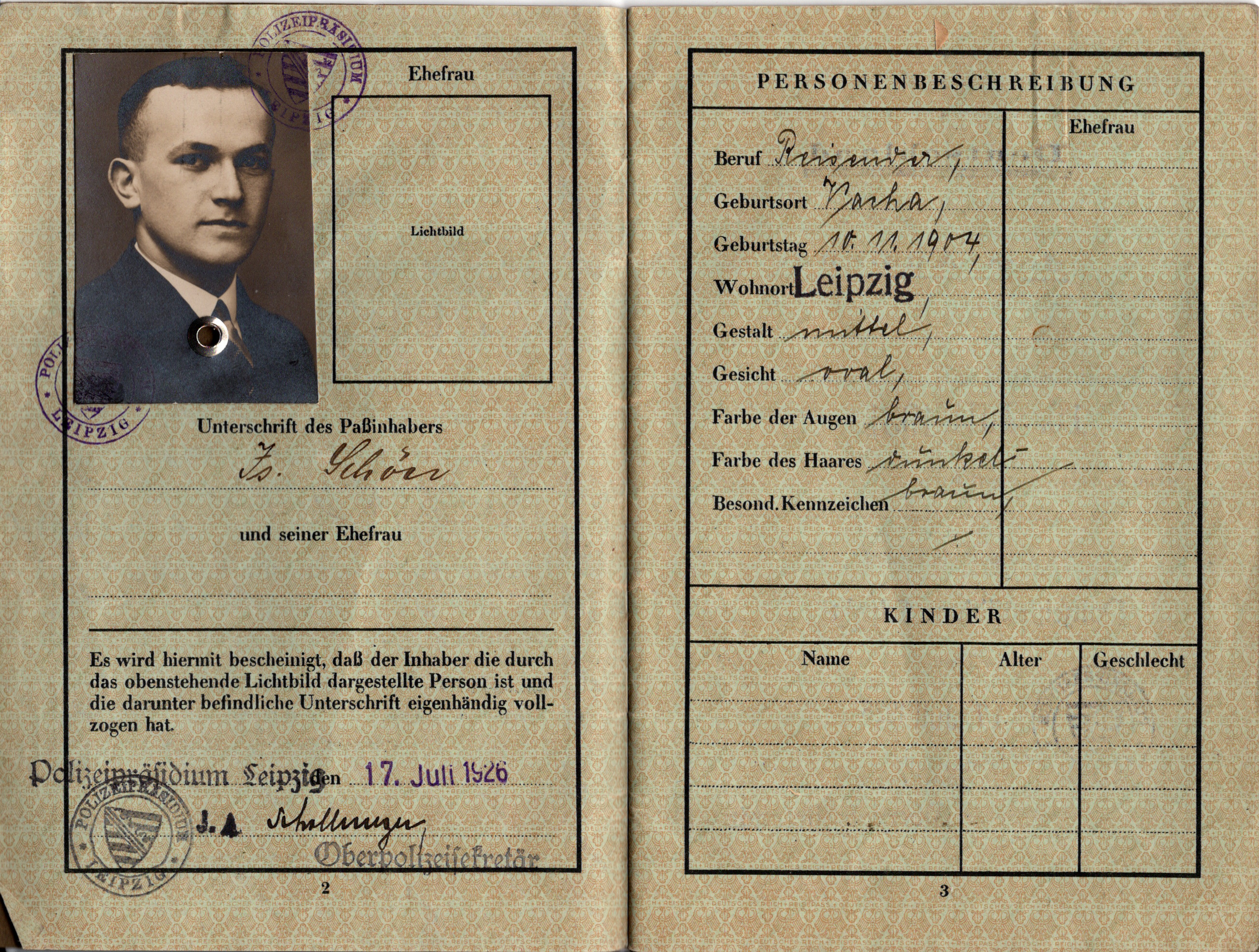


Persecution
Throughout the 1930s, the Nazi’s rise in Germany was increasingly felt–even in small towns like Vacha. While Irving had made his way to America in 1927, the rest of the Schoen family remained in Vacha and the surrounding area (the state of Thuringia) as well as Leipzig. As chronicled in Günter Hermes‘ “Timetable for the History of Vacha”, anti-Semitism came to Vacha as early as 1935:
A large culture and work conference of the circle Eisenach-SOUTH of the NSDAP is held in Vacha, connected with the exhibition “Thuringian Race”, which is constructed from 15 to 28 February in the secondary school. More than 1000 political leaders, bureaucrats and authorities march through Vacha; all halls are available for events. The general exhibition is held in the school auditorium. The visit of this exhibition and the associated events is made compulsory for all party members and members of the subdivisions such as: SA, SS, NSKK, HJ, BdM, Frauenschaft, DAF, NSKOV, NSV, NSLB, NSBA.
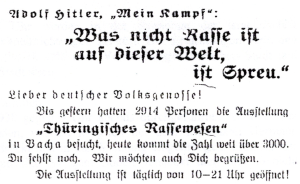
“Adolf Hitler, ‘Mein Kampf’: ‘What is not [of the Aryan] race in this world, is chaff.’
Dear German people!
As of yesterday, 2914 people had visited the exhibition ‘Thuringian Race’ in Vacha, today the number comes well over 3000. You are still watching. We welcome you. The exhibition is open daily from 10-21.”
A year later, this bigotry is openly expressed in the local newspaper:

“The textile goods business of Willy Katz, Vacha (Lower Gate) is property in Aryan possession!
Opening: Saturday, September 12, 10AM
Convince yourself
My basic fact:
Quality goods at solid prices!
Gustav Mueller, Vacha Lower Gate”
Another article in July 1938, noting the decline of the Jewish community in the town:
“Jewish property strongly diminished
Jewish property in Vacha has declined sharply, and in 1933 the local Jews owned no less than 22 built-up plots, including the old castle, the synagogue and ten commercial buildings. To date, the following have returned to Aryan ownership: the old Wendelstein castle, 7 commercial buildings, 3 residential buildings and 1 warehouse, altogether 12.
In Jewish hands are still 9 houses and the synagogue; at 2 houses sale negotiations are hovering. Today there is only one Jewish business left.”
On the night of October 9, 1938, the Synagogue on School Street is desecrated by unknown vandals. The investigation leads nowhere, and restoration of the synagogue is declined by the town. Ownership of the building’s remains is contested between Vacha and the Jewish community of a neighboring town.
By November 9, 1938, the hatred reached a boiling point:
“At 9 o’clock in the evening on 9 November 1938, the local population attacked the Jews, only the merchant Hermann Strauss, Steinweg, had their front door pressed in and their house forced in. The man was beaten and kept from getting up off the ground. Frau Strauss kept hidden and thus could not be found.
Further, at the livestock dealer Robert Hecht, Schulstrasse, some windows were demolished, they (the Nazis) penetrated into the house to capture the cattle dealer Robert Hecht, but he allegedly on that day traveled to Berlin.
At the livestock merchant Kaufmann Schoen’s, only 2 shutters and windows were destroyed. The destruction is only a light one.
In protective custody are:
Merchant Hermann Goldschmidt, born. on June 24, 1886 in Wehrda, Huenfeld, living in Vacha, Voelkershaeuserstrasse 20 and
Merchant Hermann Strauss, born on March 17, 1896 in Grebenau, Alsfeld, living in Vacha, Steinweg 2.
Weapons could not be found on any Jew. 4,800 RM were secured from the Jew Hermann Strauss.
Gez. Braemer
Police sergeant major”
Susan Taube née Strauss recalls:
I was 12 years old when I left for Frankfurt. I don’t have pleasant memories about Vacha, I was 7 years old when Hitler took over, and as a Jewish child felt it at once in school. Children I used to play with ignored me at once, and there were only 4 Jewish children in my age group.
In addition to increasing violence at the hands of their own neighbors, by 1938 the Jewish people of Germany were required to register themselves as Jewish citizens with the local governor; while targeted fines and required identification became increasingly common.

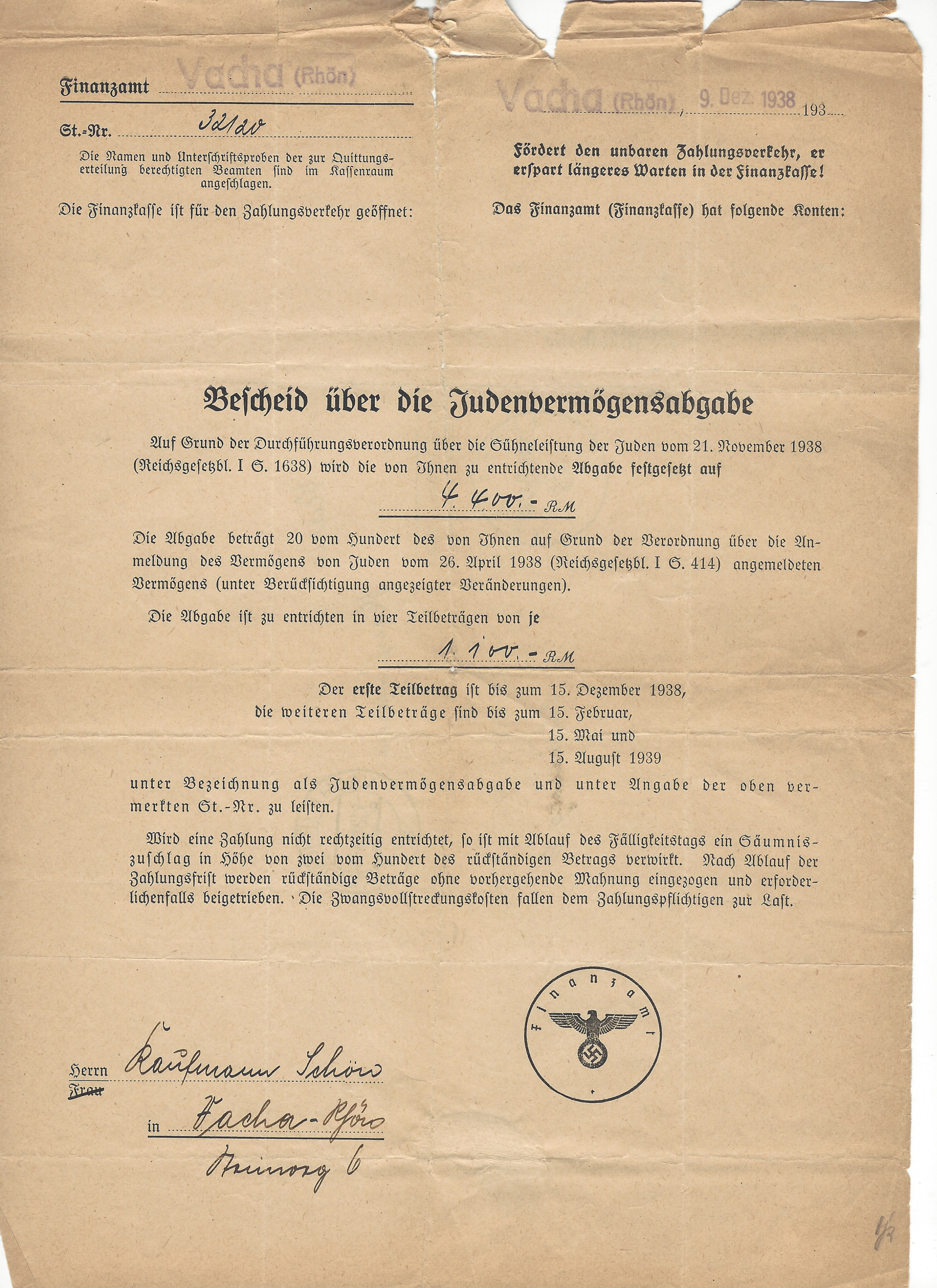
The above “Jewish Donation Tax” became a regular injustice upon Jewish Germans beginning in November 1938, as the government levied a one-billion-mark fine against the Jewish people. The final paragraph of the citation reads: “If payment is not made on time, payment of a deposit of two percent of the amount due will be made. After expiry of the payment date, any amounts due will be collected without prior reminder and, if necessary, seized. The foreclosed funds are charged to the debtor.”
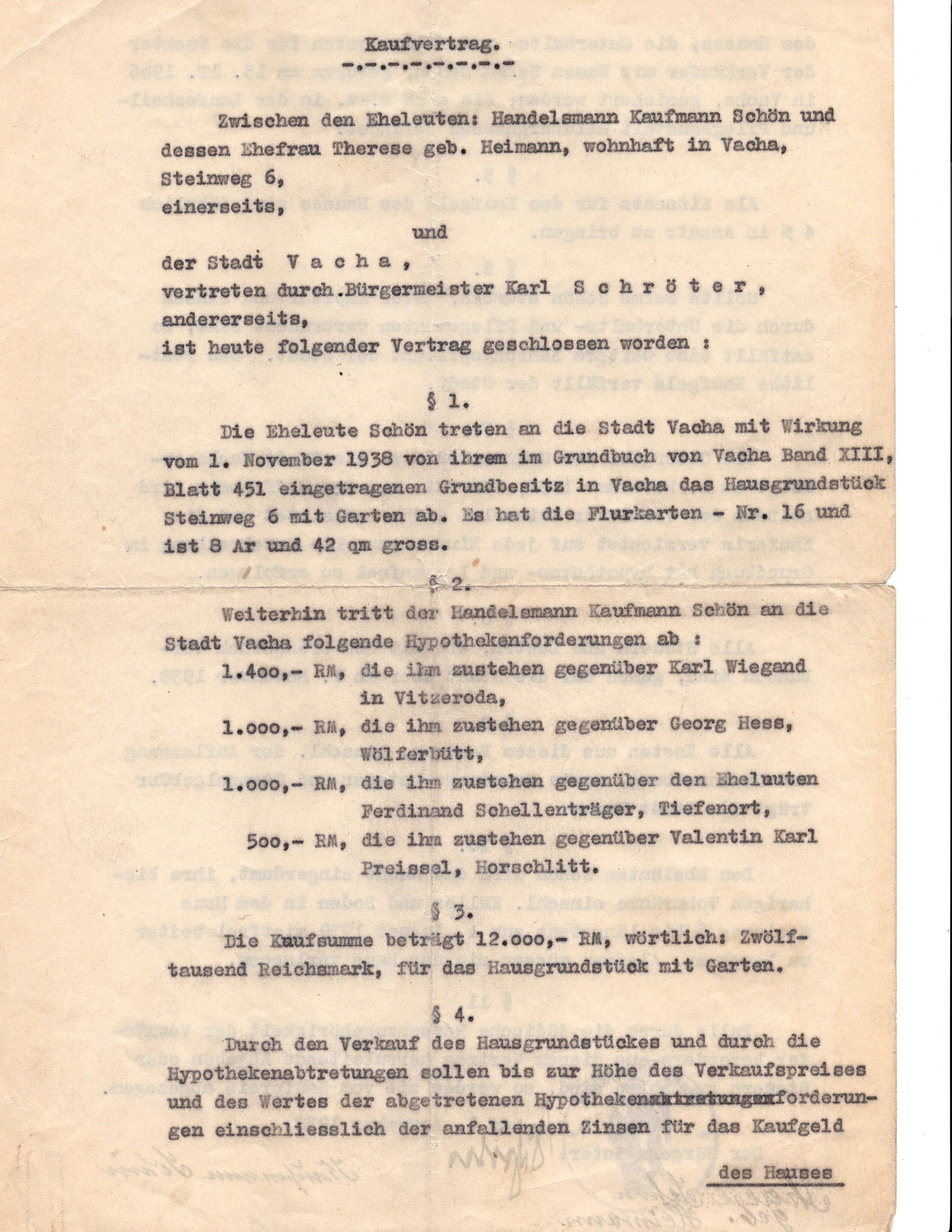

Above is a contract of sale between Kaufmann/Therese Schoen and the city of Vacha. The Schoen family sold much of their land and estates to the city as regulations about Jewish ownership became increasingly oppressive. Perhaps most sickening of all is the final, 11th clause: “If, due to the seller belonging to the Jewish race, dues or surcharges deriving from this contract are payable and required, they shall be deducted from the purchase price.”
Irving’s Correspondence
Throughout the rise of Nazi power and rhetoric in Germany, Irving maintained correspondence with friends and family across Germany after moving to New York. Irving, now living in Long Island, received numerous letters from cousins, friends, and neighbors throughout 1938 requesting his help in their emigration from Germany:


During this time, he corresponded often with his cousin Heinz Heimann, originally from Meiningen.










Dear Irving,
I recently wrote to you that I think it would be better if you put your parents on the ship Manhattan Tourist-Class, Room C 45 / All Hamburg from 22.3 or Southampton from 24.3.39. and sent some money.
Up to 2 months ago people were receiving about RM 50.- for emergency purposes. This urgency no longer exists. Instead, your parents only get RM 95. board money per person. So they have to pay for all expenses on board, tips and the landing fee.
So far you could still take 10 RM.- in foreign currency per person. Today I hear that you can’t exchange this 10 RM.- here anymore. It is therefore absolutely necessary that you send your parents some money on the ship, because you do not know what kind of ancillary expenses can arise. Also I couldn’t find out how high the landing fee is.
We could pay the poll tax here. It is therefore advisable that you contact the United States Lines there and instruct them to hand over the money to your parents on board. But make sure that it can be done so that your parents do not have to worry about it, but that you give them the money when they are on board.
I do not know if I can take care of this, or if I’m allowed to go to the ship with your parents, because as you in the U.S. may have heard, companions are no longer allowed to accompany the emigrants to the ship but have to say goodbye at the pier.
What I can do from here, I do understandably myself.
Please do the above. I’ll go back to Vacha in the morning. For today only hearty greetings,
Yours,
Heinz

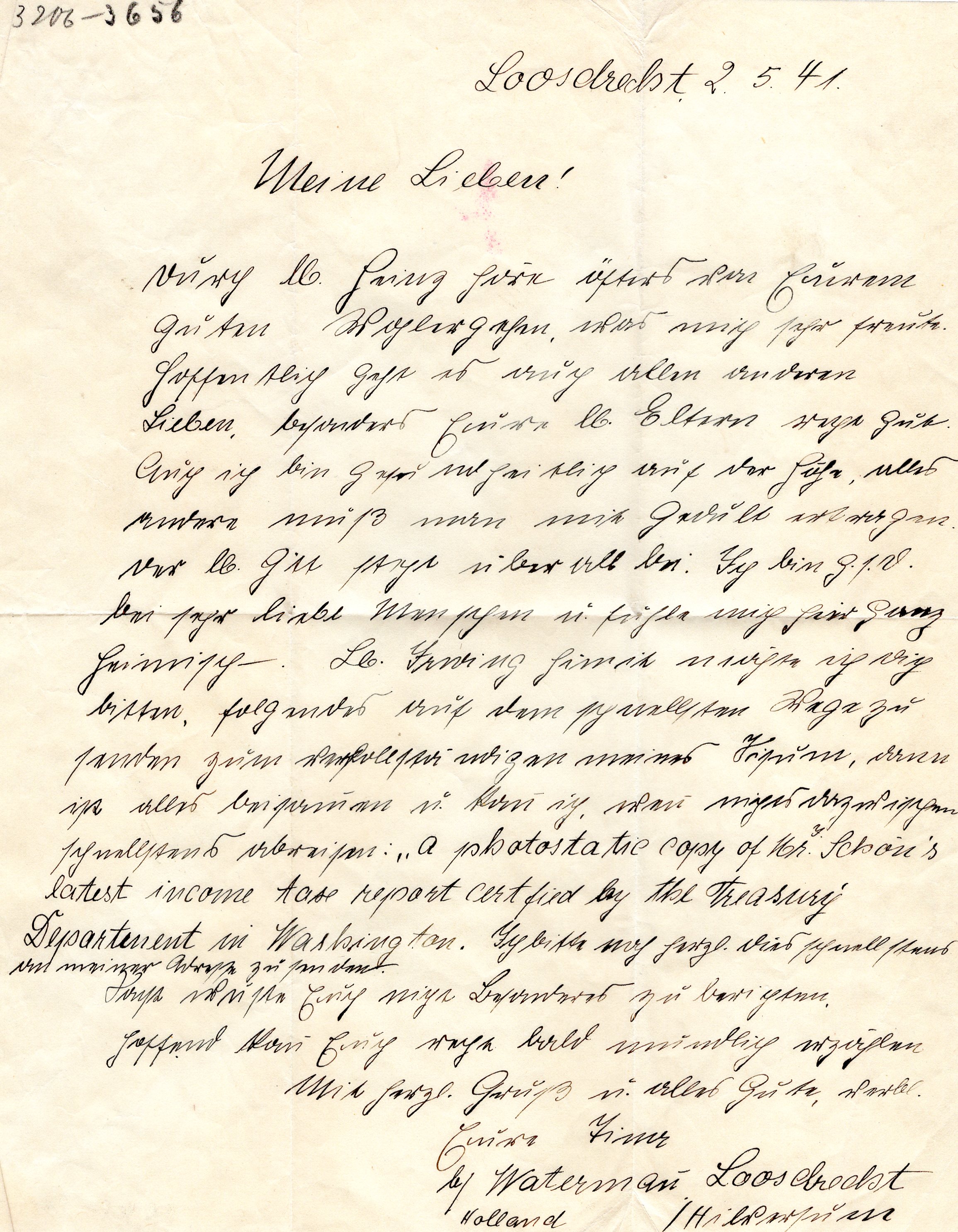
Loosdrecht, May 2, 1941
My dear ones!
I hear frequently about your well-being from M Prinz, which pleases me greatly. I hope that all of your other loved ones are well, especially your dear parents. I., took, am healthy, emotionally at a high point; everything else must be borne with patience. May our loving God stand by us. Thank God, I am staying with very good people, and I feel very much at home here. Dear Irving, I want to ask you to send me the following so that I can complete [my application for] the visa; then everything will be together, and then if [unintelligible] I can depart quickly: a photostatic of Mr. Schoen’s latest income tax report, certified by the Treasury Department in Washington. I ask that you send this as quickly as possible to my address.
Other than that, I can think of nothing else to report. I hope that I will soon be able to tell you in person.
Heartfelt greetings and wishing you all the best,Your Tina
c/o Waterman, Loosdrecht
Hilversum, Holland



Just as with Tina and Heinz, Irving provided documentation of tax and citizenship–as well as the affidavits listed shown below–for dozens of people seeking shelter from Nazi persecution. In 1938-41, Irving sponsored 69 individuals who emigrated to the United States. He was required to obtain affidavits of support for each and every family member or friend whose emigration he wished to sponsor:

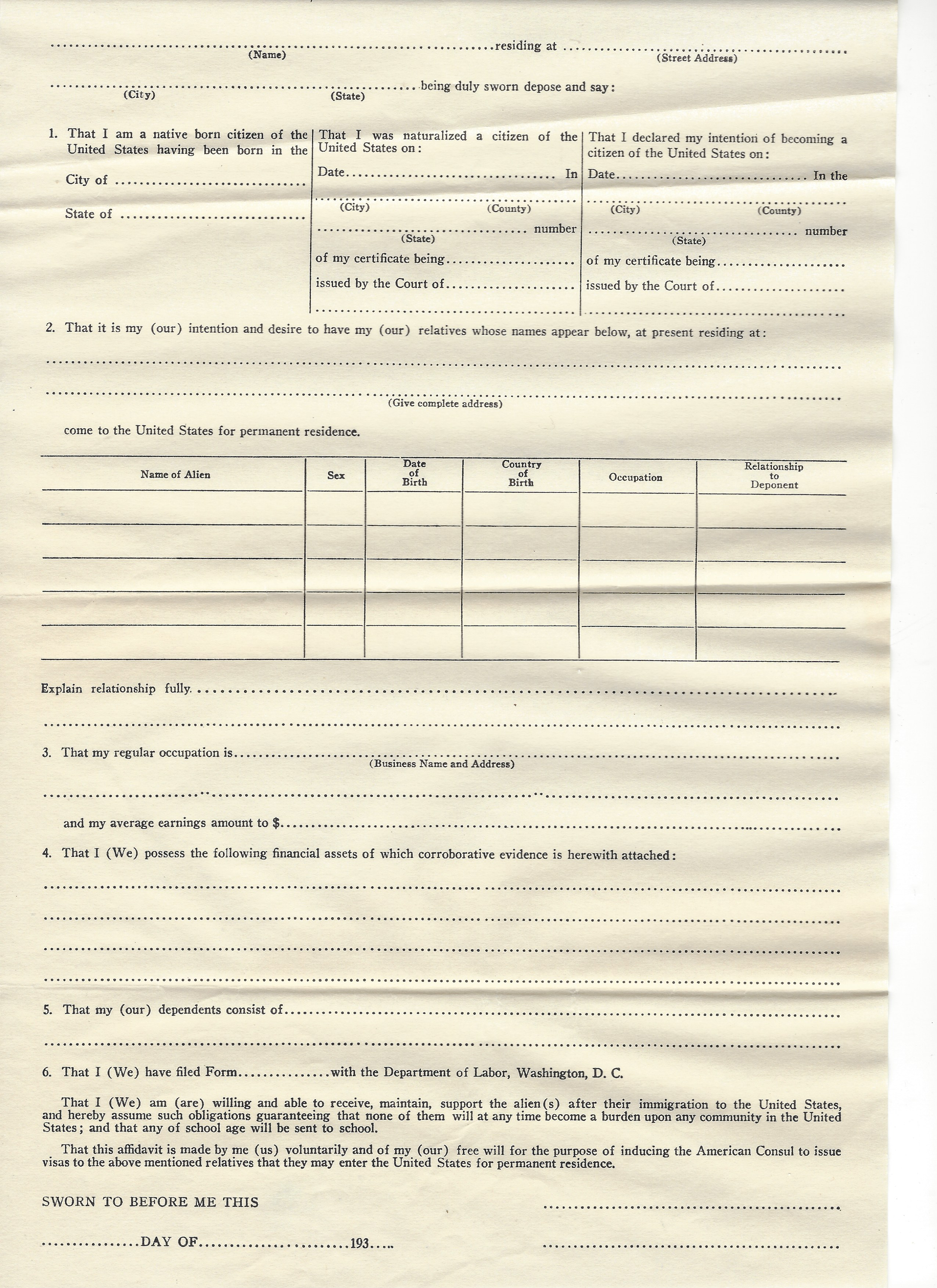
Emigration
The family was forced to sell their land back to the city of Vacha in November 1938. As the Nazis continued their persecution, the family saw the need to emigrate. Through Irving’s efforts nearly all of them would escape and survive the Shoah by emigrating to the U.S. Yet they were forced to leave generations of possessions, memories, and neighbors behind.
For a record of all known Jews of Vacha that were murdered in the Shoah, click here.

Below is an emigration questionnaire submitted by Kaufmann and Therese upon their emigration from Germany in 1939. In addition to questions regarding their religion and ethnic background, the questionnaire required all of their assets to be documented, accounted for, and partitioned for various fees of the regime. At the end, Kaufmann writes, “If, after submission to the Gold Discount Bank, I have another amount remaining, I will make it available to my needing family members for their exemption.”

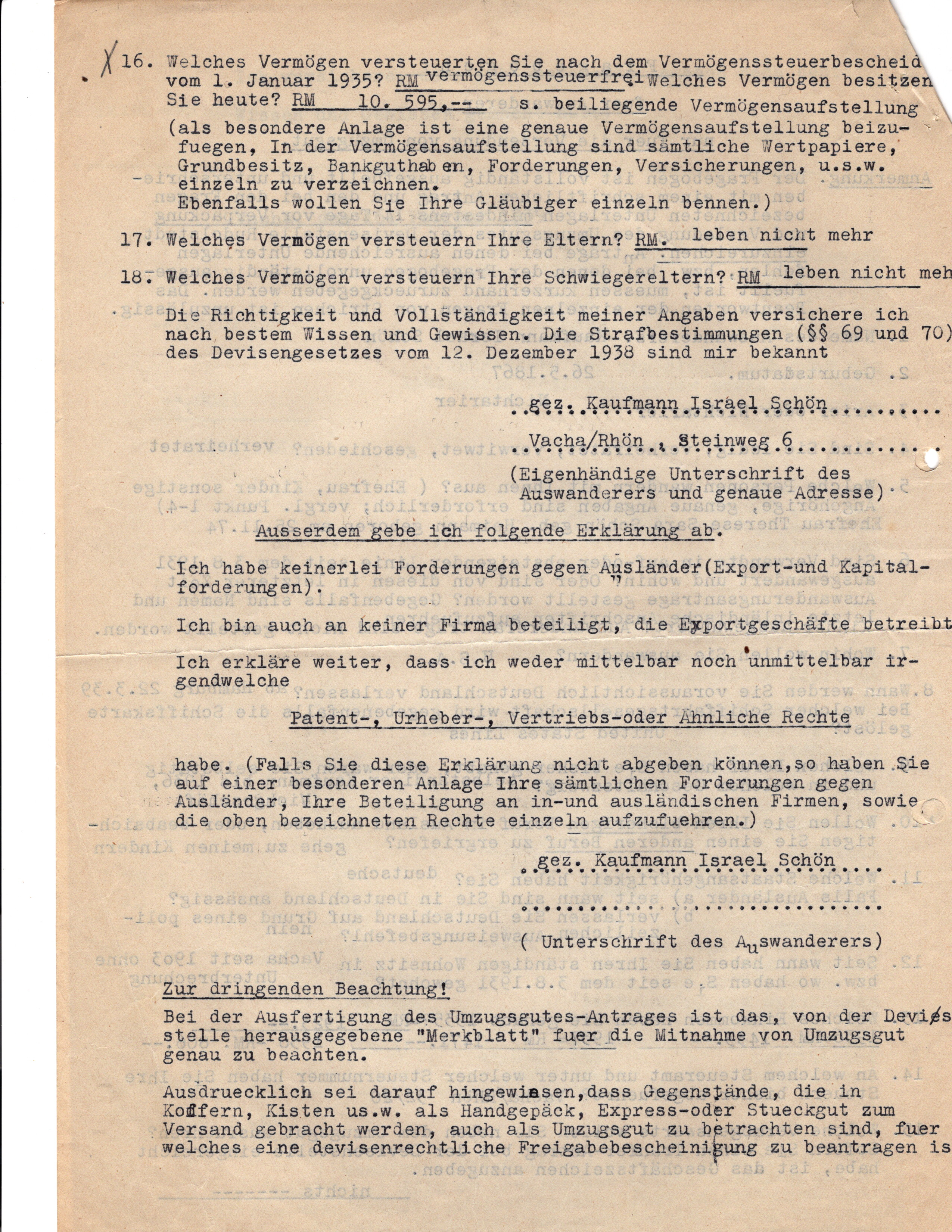



Selma Schoen

Selma Schoen, Ken’s aunt, was killed by the Nazi T4 program as a “life unworthy of life.” She was hospitalized for an emotional illness that today no longer needs hospitalization.
Her exact death date is not known but it is thought that she was in her late thirties. Sadly, very little remains known about her after the last of her family left Germany in March 1939.
Ken discovered his aunt Selma’s existence only after his parents had died. A family tree (stammbaum) revealed her named and surprised the younger family members. Who was Selma? No one wanted to talk; the sorrow or the shame may have been too great. More recently, her two surviving brothers shared their painful memories.
In 1986, Ken decided to honor Selma by naming his daughter after her. Today, Rebecca Selma Schoen is a living memorial to her great aunt. Although very little is known about Selma Schoen of Vacha, Germany, she is respectfully remembered. During his trip to Vacha in 2008, Ken and his son honored Selma in the Jewish cemetery in town.
~ From the Hatikvah Holocaust Center’s memorial book
(Click here to read more about Selma)
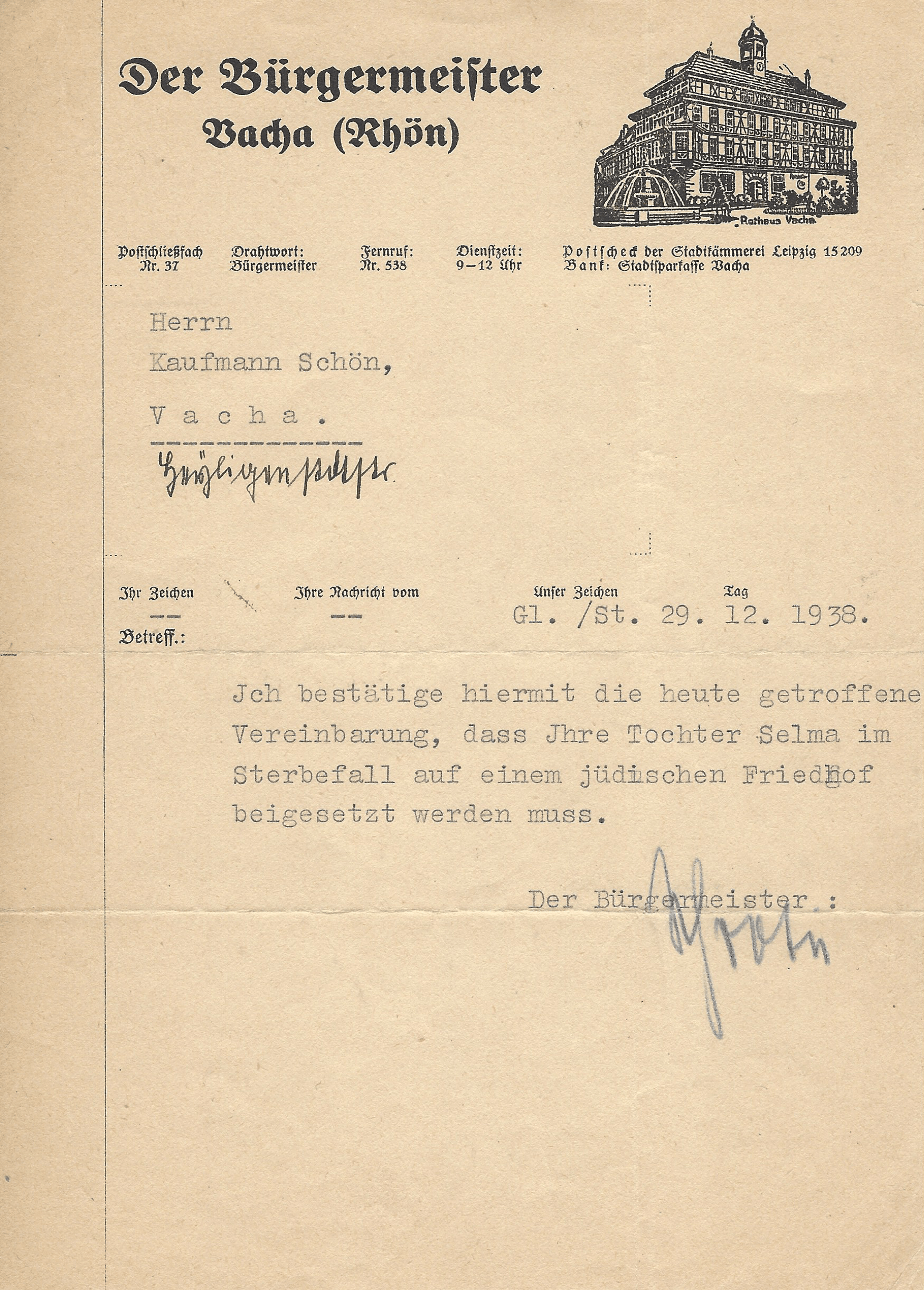
A chilling letter written by the mayor of Vacha in 1938, addressed to the Schoen family as they prepared to leave the country: “I hereby confirm the agreement reached today that your daughter Selma must be buried in a Jewish cemetery in case of death.” Selma was never given a burial, nor was her death memorialized until Ken’s 2008 journey to Vacha.

America
Irving would marry Betty Sternberg in the US circa 1938. He started the Enterprise Coffee Company circa 1940. The company would be shut down during the Second World War due to the US coffee quota established in 1942. The company would resume business around 1947. After losing their first child in childbirth, Irving and Betty would have two children together: Carol Eva (Hanna) and Ken (Yekutiel).
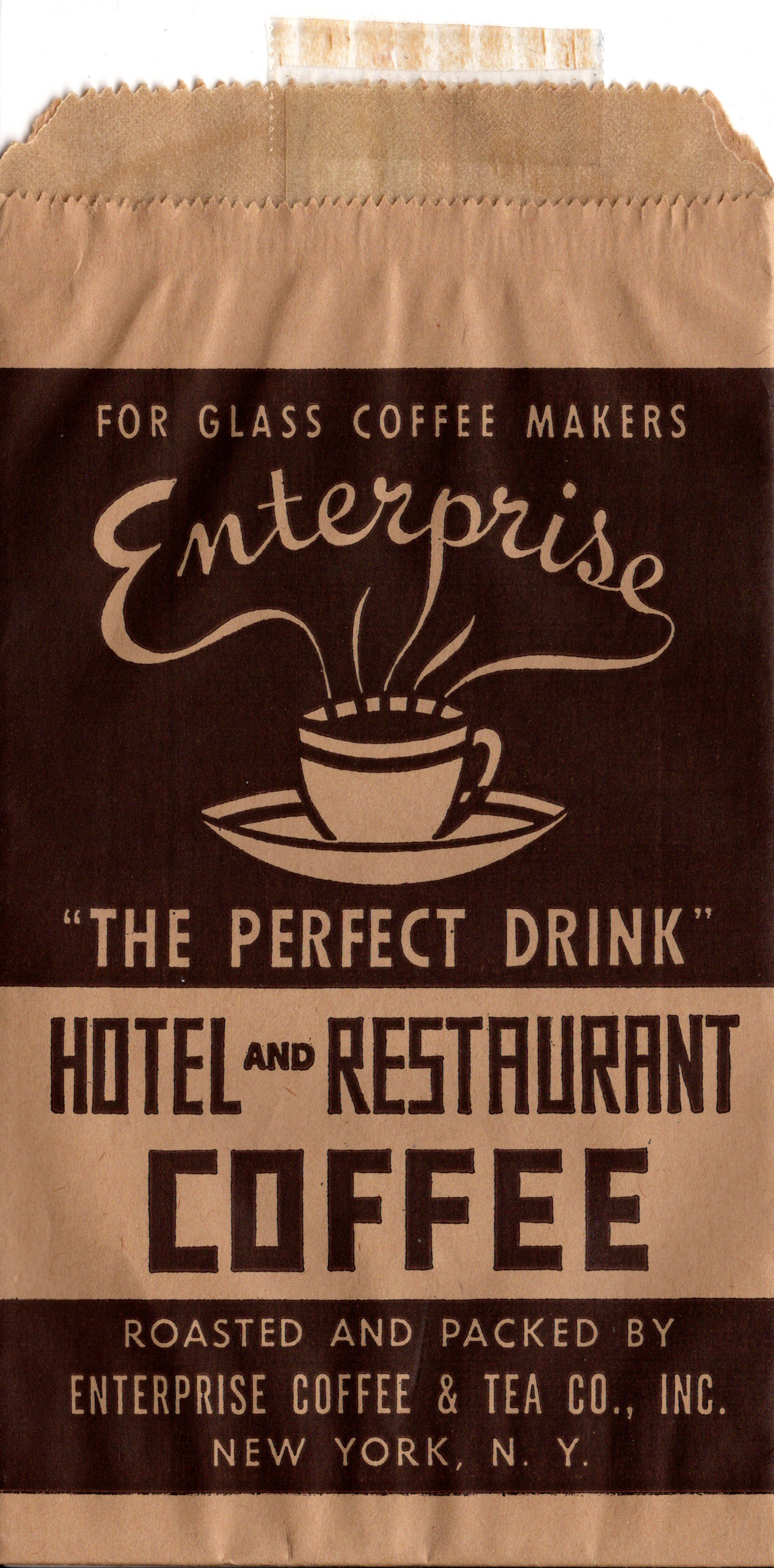

Front row: Therese Schoen, Rena Katzenstein, and Kaufmann Schoen
Ken’s cousin, Jerry Katzenstein, would marry Frieda Rosenstoch in the U.S. The extended Schoen family would live primarily in New York City and the surrounding area.


